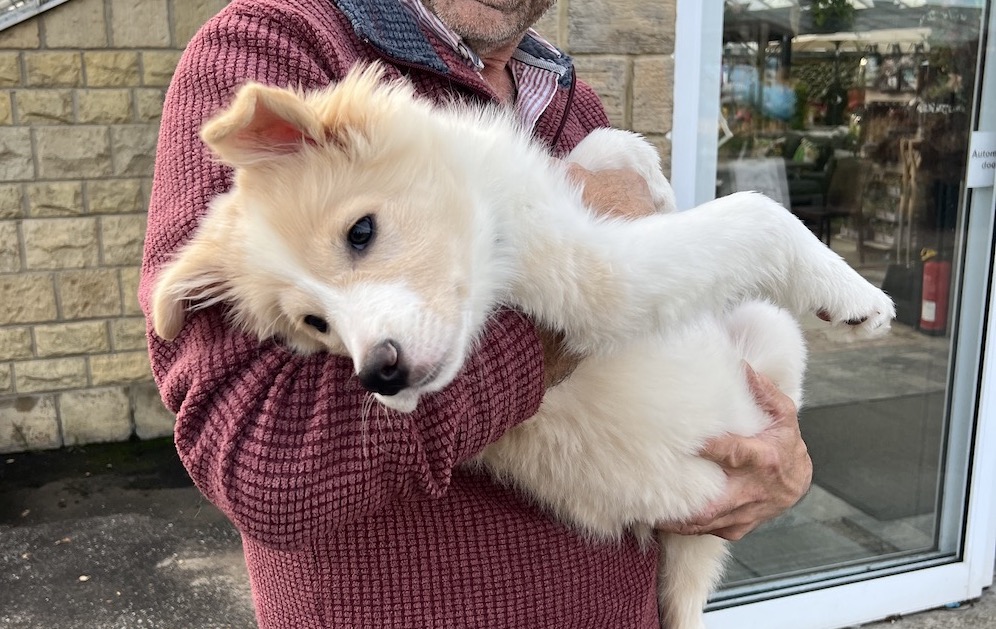Border collie puppy socialisation. What does this mean?
It means taking puppies out and about and exposing them to sights and sounds at an intensity and proximity with which they can cope, and feel happy and relaxed while experiencing the new environment. Ozzy here is listening and watching the children playing, squealing and running, but I’m watching him closely and he isn’t distressed. He is very interested and his one yawn may mean he was a little worried about something at that point, but overalll he was intrested but relatively relaxed. He settles down to eat his chew after only a few seconds and I was happy to keep him there while we had a cup of tea.
However, if I had seen lip licking, more yawning, excessive blinking, frequent shake-offs, or, even worse, ears pressed back, his body held low and his tail tucked under his body, I would have had him straight out of there, either moving to much further away where his body language tells me he is ok, or back to the car to try again another day, keeping a much further distance away the next time.
Border collie puppy socialisation DOESN’T mean putting them into situations that will scare them, which can have completely the opposite effect, and make them even more scared of the trigger than they were before. We need to watch our puppies carefully and make sure that they are ok and are happy with the environment that we take them into. Lip licking, more frequent thany usual blinking and yawning are signs that your puppy could be finding things stressful, as are panting when it’s not hot, sweaty paws, ears back and tail tucked right under the body. If you see any of these signs while out and about with your pup, move them into a different environment in which they feel more relaxed as soon as possible. Ozzy here is completely relaxed chewing on his chews, so we stayed for a cup of tea and cake!
Ensure that any people that your puppy meets are kind and gentle, don’t make any sudden loud noises and that he finds meeting them a positive experience. Be aware of walking sticks, people with children on their shoulders (strange two-headed beasts to our pups), shopping trolleys, push chairs and wheelchairs. All of the these could scare your pup. If you see these coming, be ready to move your pup away if he looks worried. It’s better to allow him to approach them, watching to make sure that he is coping and not stressed.
I would never take a 12 week old puppy to dog parks or anywhere where other dogs are offlead, with the exception, perhaps, of the beach, where there is more space and you can watch approaching dogs to make sure that they look friendly. Lots of dogs can find puppies really annoying and are likely to snap or worse, growl and lunge at your pup. Even worse, other dogs could be aggressive and attack your pup before you have the chance to move him away. Only allow puppies under 16 weeks old meet dogs that you know are 100% friendly. There is no need for your puppy to greet and play with every dog he meets. Focus instead on letting him watch calmly and safely from a distance and learn how to manage his frustration about not being able to run over and play. Treats, toys and chews can help with this.
Ideally find playmates for your pup at puppy training classes or dogs owned by friends who you already know are friendly so that they can play with safe dogs from time to time.
Cars – lots of collies chase cars (see our blog post that examines why border collies chase cars) and you must be very aware of the risks of this. Puppies that are scared by traffic while very young (by walking next to busy roads, or from experiencing occasional vehicles travelling at speed) are MUCH more likely to go on to chase, lunge, spin and bark at vehicles and it’s one of the more common collie behaviour problems. Always keep your pup away from busy roads and train stations. Just one vehicle that rushes past, making your pup jump, can be enough to start a car phobia. Motorcycles that are really noisy and appear suddenly can be the worst culprits, but fast cars, air breaks on buses and lorries, cars that backfire, tractors and farm implements can all be problematic. The best advice I can give is not to walk close to any roads, and introduce your pup to slow moving vehicles at a distance to start with, watching their behaivour, and only moving closer the next time, if you can see that they are coping.
Ideal environments to expose your puppy to while he is still young include:
- Garden centres
- Town centres (pedestrianised)
- Country parks where all dogs are kept on leads
- Quiet beaches
- Children’s playgrounds
- School picking up time (firstly from the safety of your car)
- Playing fields (avoid if too many dogs off-lead)
- The very edges of quiet car parks
- Edges of supermarket car parks (to get them used to trolleys)
- Puppy classes – but monitor your pup – some collies don’t cope well in puppy classes
Places to avoid during border collie puppy socialisation:
- Any roads
- Dog parks (unless you can take your pup to watch from a distance)
- Anywhere where dogs are offlead

